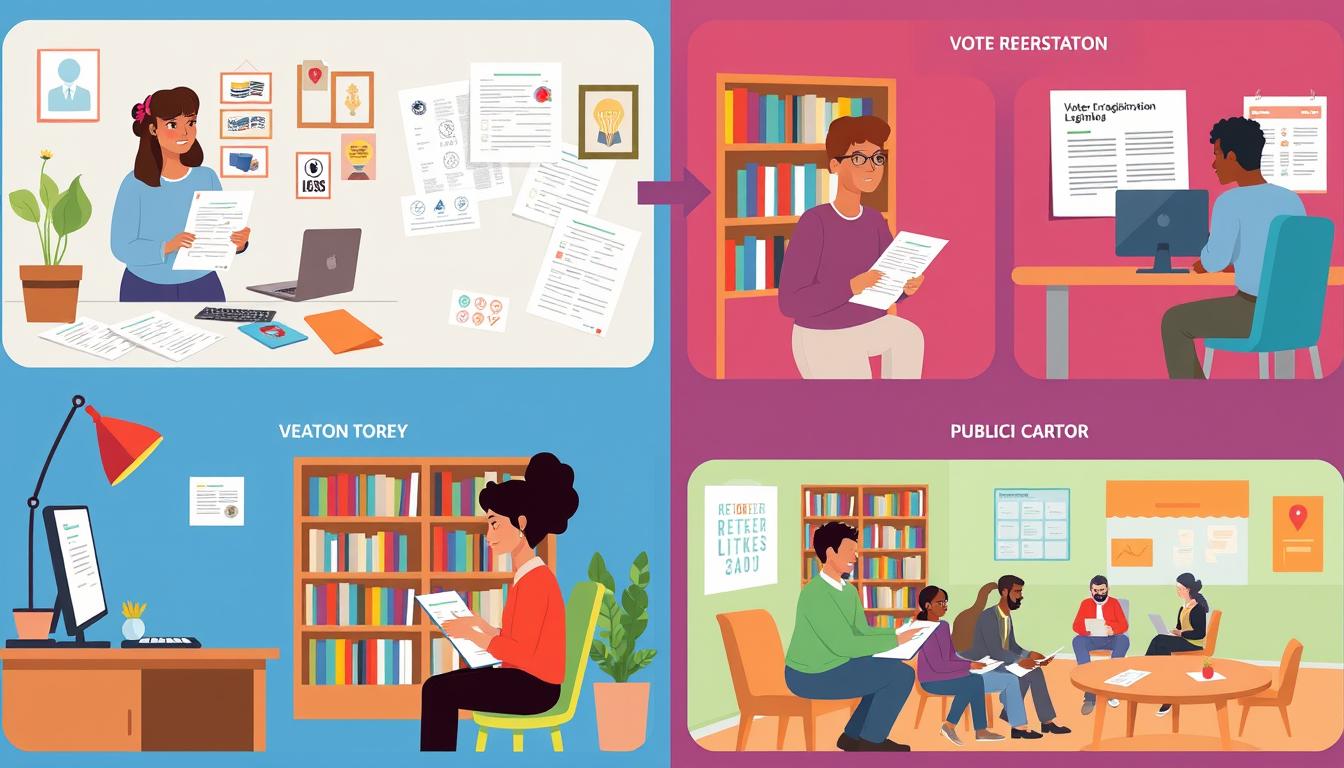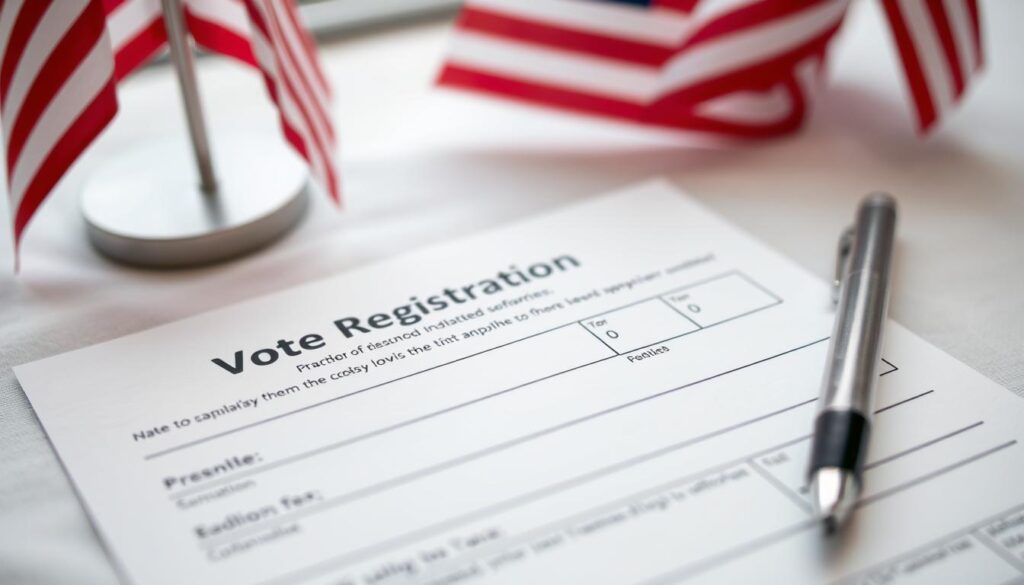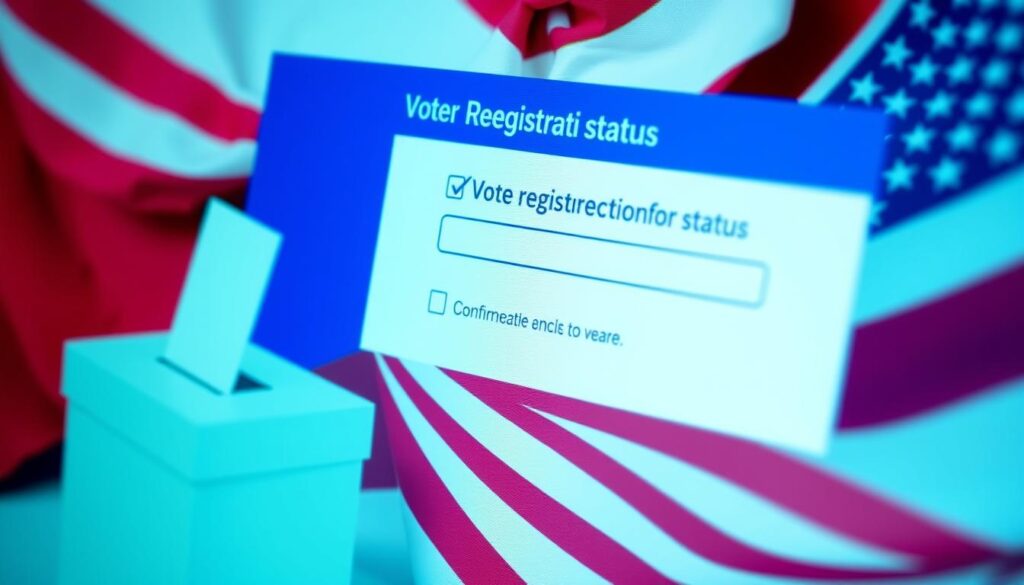
Your vote is very important in democracy. Knowing how to register to vote lets your voice be heard. California shows how important it is to vote, with over 22 million voters.
This guide will help you. You’ll learn about BallotTrax and where to find safe places to drop your ballot in Southern California.
Programs like “Where’s My Ballot?” help you track your vote-by-mail ballot. Services like BallotTrax send updates by email, SMS, or call. This keeps you informed about your ballot.
These ballot drop boxes are very safe. By following this guide, you’ll help make a big difference in your community and country.
Key Takeaways
- California has 22 million registered voters as a testament to civic engagement.
- Programs like “Where’s My Ballot?” and BallotTrax offer ballot tracking updates.
- Registered voters can drop ballots in secure drop boxes, monitored for compliance.
- Ballots in Los Angeles County are collected from drop boxes every 48 to 96 hours.
- Maintaining up-to-date voter registration ensures you can participate in every election.
- Voter registration guides lead to increased voter enrollment by 7%.
- Early voter registration boosts participation rates by 25% in some areas.
The Importance of Voter Registration
Voter registration lets you vote in the democratic process. It makes sure everyone who can vote does. Your vote matters because it helps make laws that affect our lives.
Why Your Vote Matters
Knowing your vote matters is powerful. Every vote helps choose leaders. In North Carolina, a small difference in votes made a big change.
In Pennsylvania, you can vote by mail. This is a special chance to make your voice heard.
Empowering Your Community
Voter registration helps empower community through voting. Voting can change laws to meet community needs. In Connecticut, new voters can vote right away.
By voting, communities can share their views. Lancaster County GOP encourages early voting to make sure everyone’s voice is heard.
Historical Significance of Voting Rights
The voting rights history in the U.S. shows a long fight for fairness. The Civil Rights Movement was a key moment. It shows why voting is so important.
New York makes you re-register if you miss two elections. This shows how crucial it is to stay active in voting.
| State | Registration Deadline | Special Notes |
|---|---|---|
| New Jersey | 21 days before Election Day | Permanent registration |
| New York | By Oct. 26th for mail applications | Re-register if inactive in two consecutive Federal Elections |
| Connecticut | Oct. 18th (mail) | Same-day registration available |
| Pennsylvania | Until Oct. 29 for mail-in/absentee ballots | Every voter can request a mail ballot |
How to Register to Vote in the U.S.
It’s important to know how to register to vote in the U.S. This lets you have a say in elections. Let’s look at the ways you can register.

Online Voter Registration
Many states now have online voter registration. It’s easy and fast. You just need your driver’s license or state ID number.
In states like New Jersey, you can register online quickly.
Register to Vote in Person
You can also register in person. Go to your local election office or Motor Vehicle Commission (MVC) offices. Make sure you have the right ID.
In Connecticut, you must be a certain age and a citizen to register.
Absentee Voter Registration
If you can’t register in person, absentee voter registration is for you. You mail your form to your local election official. Check your state’s rules.
In New Jersey, mail your form to the County Commissioner of Registration/Superintendent of Elections.
Voter Registration Deadline
Every state has a voter registration deadline. Knowing this date is key. If you miss it, you can’t vote.
In New York, the deadline for the General Election is October 26. Connecticut has different deadlines, with the mail-in deadline being October 18.
- New Jersey: 21 days before the election
- New York: October 26
- Connecticut: October 18 (mail-in), 11:59 PM for online, 8 PM for in-person
Knowing these dates helps you register on time. This way, you can vote without any problems.
Checking Your Voter Registration Status
It’s important to know if you’re registered to vote. This lets you vote without problems. We’ll show you why checking is key, how to do it online, and how to update your info.
Why It’s Important to Check Your Status
Checking your voter status means you can vote. If you’ve moved or changed your name, you might need to update. Doing this early avoids Election Day problems.

How to Check Your Voter Registration Status Online
Checking online is easy and fast. Go to your state’s Secretary of State website or your local election office. Just enter your name and birthdate to see if you’re registered. It’s simple and you can do it from home.
Updating Your Voter Registration Information
Update your info if it’s changed. You can change it online or at your DMV. Keeping your info current means you get voting materials and won’t have problems at the polls.
Key Deadlines:
- Online voter registration deadline: October 15.
- Mail-in voting deadline: Ballots must be postmarked by Election Day.
- Early in-person voting dates: October 28 – November 3 from 8:30 am to 7:00 pm.
- Election Day operating hours: 7:00 am-8:00 pm.
- Same-day voter registration available on Election Day.
By checking and updating your voter status online, you make sure your vote counts in every election.
Conclusion
This guide on voter registration shows how important it is to have your say. By voting, you help shape our country’s future. You also make sure leaders do what’s right and meet community needs.
The voter registration process might seem hard. But it’s a key part of being part of our democracy. You can register online, in person, or by mail.
Knowing the deadlines and keeping your voter info current is crucial. This way, you can really make a difference. For example, in California, voting changed laws about crime.
Now, with Proposition 36 coming up, you have another chance to make a difference. It’s about crime and keeping our communities safe.
In short, voting is not just a right. It’s a powerful way to bring about change. Learn about registering and stay informed. This way, you can vote with confidence and help our democracy stay strong.
FAQ
Why is registering to vote important?
Registering to vote is key because it lets you join in elections. It means you get to help choose leaders and make laws that affect you and your area.
How can I check my voter registration status?
You can check if you’re registered to vote online. Use your state or county’s database. Most states have tools where you can check with a few details.
What are the voter eligibility requirements in the U.S.?
To vote in the U.S., you must be a citizen, 18 or older, and live in your state. Some states have rules for people with felonies or mental issues.
How do I register to vote online?
Many states let you register online. Go to your state’s election site or use Vote.org. You’ll need some personal info and a state ID number.
Where can I register to vote in person?
You can register in person at many places. Try local election offices, DMVs, libraries, and government buildings. Check with your local office for where and when.
What is absentee voter registration?
Absentee registration is for those who can’t vote in person. Reasons include travel, illness, or being abroad. Ask your local office for an absentee ballot.
How can I find the voter registration deadline for my state?
Deadlines to register vary by state. Look on your state’s election site or use the U.S. Vote Foundation. Make sure to register before the deadline to vote.
How can I update my voter registration information?
Update your info by filling out a new voter form. Do this online or in person. It keeps your record up to date with your current details.
What tools are available to track my vote-by-mail ballot?
States like California have tools like “Where’s My Ballot?” or the Vote by Mail Status Tool. These let you track your ballot and get updates.
How can voting empower my community?
Voting gives your community a voice in government. It helps choose leaders who tackle local issues and make policies that affect daily life.

